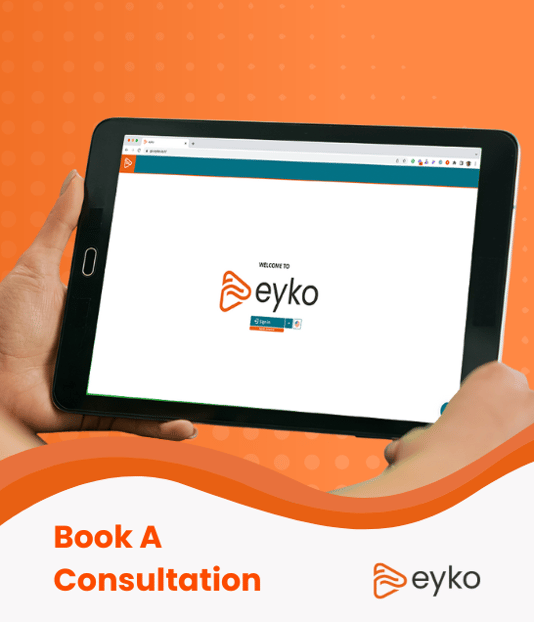Transforming ESG Reporting: From Burden into Competitive Advantage.
Introduction
In today's rapidly evolving business landscape, the term "ESG" has become a buzzword that executives and investors alike can't ignore. ESG, which stands for Environmental, Social, and Governance, has shifted from a mere concept to a core element in the strategic plans of companies worldwide. But why has ESG reporting become such a big deal for companies today? What are the challenges they face in delivering ESG reporting? And how can ESG reporting transform from a burden into a golden opportunity?
In this blog, we'll delve into these questions and explore the transformative potential of ESG reporting. We'll also discuss the merits of standalone ESG reporting versus integrated financial and ESG reporting, the benefits of ongoing ESG business monitoring, central repository management, and how the eyko multi-source reporting and analytics platform can help turn ESG reporting from a burden into a business opportunity.
Why is ESG Reporting a Big Deal for Companies Today?
Environmental, Social, and Governance (ESG) reporting has emerged as a big deal for companies today for several compelling reasons:
Regulatory Pressure: Governments and regulatory bodies worldwide are introducing laws and guidelines that require companies to disclose their ESG practices. This trend is especially prominent in Europe with regulations like the EU Taxonomy Regulation and Non-Financial Reporting Directive (NFRD). Non-compliance can result in fines and reputational damage.
Investor Demand: One of the most significant driving forces behind ESG reporting is the escalating demand from investors. Institutional investors, like pension funds and asset management companies, have recognized the impact of ESG factors on long-term financial performance. They are increasingly considering ESG data when making investment decisions, and companies that fail to report on their ESG performance risk losing out on these crucial funds.
Reputation and Branding: ESG reporting has a direct bearing on a company's reputation and brand image. As consumers become more environmentally and socially conscious, companies that are perceived as responsible and ethical gain a competitive edge.
Risk Mitigation: ESG reporting helps companies identify and mitigate risks associated with environmental, social, and governance factors. For instance, a company's carbon emissions could pose financial risks due to future carbon pricing regulations or changing consumer preferences for sustainable products.
Innovation and Cost Reduction: Focusing on ESG issues can drive innovation and cost savings. Companies that optimize their resource usage, reduce waste, or foster diversity often find that these efforts lead to efficiencies and a more engaged workforce.
What are the main challenges in Delivering ESG Reporting
While the motivations to engage in ESG reporting are compelling, it's not without its challenges:
Data Quality and Consistency: Gathering reliable ESG data can be challenging. Data may be scattered across different departments and systems, and maintaining data quality and consistency can be a complex task.
Data Collection: ESG reporting requires collecting a substantial amount of data from a wide range of sources. This can be overwhelming for companies, especially those operating across multiple regions and industries.
Complexity of ESG Issues: ESG issues are multifaceted and encompass a broad range of topics, from carbon emissions to labor practices to corporate governance. Understanding how each issue applies to the specific business context can be a complex task.
Reporting Standards and Frameworks: The lack of standardized ESG reporting frameworks can make it difficult for companies to know what to report and how to report it. There are numerous frameworks, such as GRI, SASB, TCFD, and SDGs, and choosing the right one can be daunting.
Should ESG Reporting be standalone or integrated with Financial Reporting.
Integrating ESG factors into your financial reporting rather than taking a standalone ESG reporting approach can have several compelling reasons:
Enhanced Decision-Making: Integrating ESG into financial reporting provides investors and stakeholders with a more holistic view of a company's performance, helping them make more informed investment decisions.
Risk Management: Integrating ESG factors helps identify and assess both traditional and non-traditional risks, such as environmental, social, and governance-related risks, which can impact a company's financial stability.
Cost Reduction: Addressing ESG issues within financial reporting can lead to cost savings by optimizing resource usage, reducing waste, and improving energy efficiency.
Competitive Advantage: Companies that incorporate ESG into their financial reporting can enhance their brand image, reputation, and attract customers who value sustainability and social responsibility.
Regulatory Compliance: ESG disclosure requirements are increasingly being mandated by regulators and stock exchanges. Integrating ESG into financial reporting ensures compliance and reduces the risk of regulatory penalties.
Long-term Sustainability: Integrating ESG into financial reporting encourages companies to develop long-term, sustainable business strategies, which can lead to greater resilience and success in the face of global challenges.
Innovation: A focus on ESG factors can drive innovation in product development, technology, and business processes, leading to new revenue streams and competitive advantages.
Improved Performance Metrics: Combining financial and non-financial ESG data can provide a more comprehensive set of performance metrics, helping organizations to measure and track their progress effectively.
Investor Relations: Integrating ESG into financial reporting allows for clear, concise, and consistent communication of ESG efforts, which can positively influence investor relations.
In summary, integrating ESG into financial reporting can lead to more comprehensive, accurate, and actionable information for decision-makers, reduce risks, enhance brand value, and align a company's financial performance with its broader social and environmental responsibilities, ultimately contributing to long-term sustainability and competitiveness
Ongoing ESG Business Monitor or just a Snapshot in time.
ESG reporting is often viewed as a static snapshot of a company's performance at a specific point in time. However, there are compelling reasons to shift towards ongoing ESG business monitoring:
Proactive Risk Management: Continuously monitoring ESG performance allows companies to proactively identify and address emerging risks. This is particularly crucial in a rapidly changing world where ESG issues can evolve quickly.
Real-time Decision Making: Ongoing monitoring provides real-time data that can inform strategic decision-making. Companies can adjust their ESG strategies promptly in response to market changes or stakeholder demands.
Transparent Progress Tracking: Consistent tracking of ESG metrics over time can demonstrate a company's commitment to improvement and sustainability, thus enhancing its reputation.
Avoiding Reporting Fatigue: Frequent, detailed reporting can lead to reporting fatigue. Ongoing monitoring reduces the need for exhaustive, periodic reporting exercises.
Where should my ESG data reside - Central Auditable Repository or a collection of spreadsheets.
A central repository for ESG data offers several advantages over spreadsheet-based data management:
Data Integrity: Central repositories ensure data integrity, reducing the risk of errors that often arise from manual data entry in spreadsheets.
Efficiency: Retrieving, updating, and analyzing data is more efficient in a central repository. It allows for automated data collection and standardized data formats.
Collaboration: Central repositories promote collaboration among various departments and stakeholders, improving data accuracy and consistency.
Scalability: As a company's ESG reporting needs grow, a central repository can adapt and scale with the organization. Spreadsheets may become unwieldy and unmanageable as the volume of data increases.
Transforming ESG reporting from a burden to a competitive advantage with eyko.
The eyko multi-source reporting and analytics platform is a transformative solution that can help companies not only gather and organize ESG data but also enrich it with new calculations and provide flexible reporting and analytics for all users. Here's how eyko can be a game-changer:
Data Integration: eyko seamlessly integrates data from multiple sources, breaking down data silos and centralizing all relevant information. This streamlines the ESG reporting process, making it more efficient and reliable.
Data Enrichment: eyko goes beyond data collection and management by offering advanced analytics and calculations. It can help companies derive insights from their ESG data, turning it into actionable information.
Flexible Reporting: The platform provides flexible reporting and analytics tools that allow companies to create customized reports that cater to different stakeholder needs. Whether it's for investors, regulators, or internal decision-makers, Eyko can generate the right reports.
Near Real-time Monitoring: eyko enables near real-time ESG business monitoring, keeping companies updated on their performance and helping them stay ahead of emerging ESG risks.
Enhanced Decision-Making: The platform's analytical capabilities support informed decision-making, enabling companies to develop and implement ESG strategies that drive sustainability and growth.
In conclusion, ESG reporting has evolved from a mere corporate responsibility to a critical driver of business success. The demand for ESG disclosure from investors, regulators, and consumers is on the rise, making ESG reporting a big deal for companies today. While there are challenges in delivering ESG reporting, the rewards in terms of reputation, risk mitigation, and financial performance make it a valuable pursuit. Companies have the choice between standalone and integrated reporting, as well as ongoing monitoring versus snapshot-in-time reporting. The benefits of central repository management over spreadsheet-based data are clear, and eyko's multi-source reporting and analytics platform can be a powerful ally in making ESG reporting a seamless and value-generating process. By embracing ESG reporting, companies can not only meet the demands of the modern business world but also unlock the hidden potential of sustainable growth and responsible business practice.
Share this
You May Also Like
These Related Stories

Making Smart Choices in Your ERP Migration: Keeping Costs in Check

eyko Industry Solutions For You

